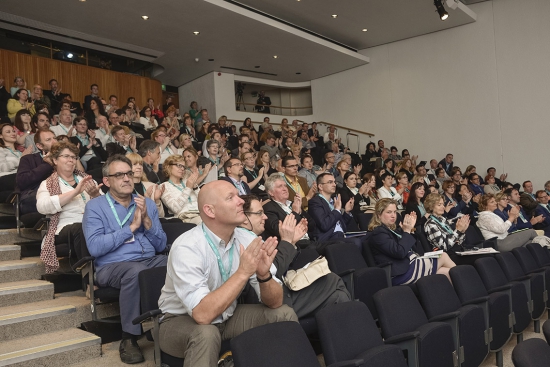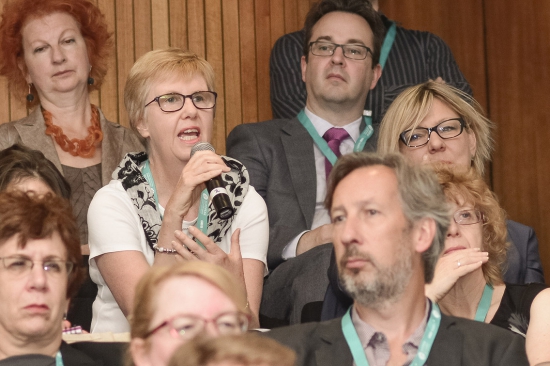Early-bird registration for the third European Healthcare Design 2017 Congress & Exhibition is now open via an online form on the EHD website. This year's event, organised by Architects for Health and SALUS Global Knowledge Exchange, promises to be more popular than ever, judging by the huge interest from individuals and organisations all over the world to the Call for Papers, which closed before Christmas.

Featuring as its main theme 'Visioning the future: Designing for change in people-centred health systems', the European Healthcare Design 2017 Congress & Exhibition will take place from Sunday 11 June to Wednesday 14 June 2017, at the Royal College of Physicians (RCP), London.
This year's event is also organised in collaboration with the Union of International Architects' Public Health Group Seminar and Global University Program in Healthcare Architecture, which takes place on Sunday 11 June (preliminary date and venue to be advised).
The Call for Papers for EHD2017 closed on 16 December 2016, and invited abstracts around several themes, including:
- Quality improvement: transforming health and care services by design;
- Care in the community: designing across the care continuum;
- Science, technology and digital health: what the future holds;
- Healthy ageing: inspiring, enabling and supporting older people;
- Sustainable development: designing to promote health and biodiversity; and
- The art of care: creating compassionate places and environments.
Healthcare in the 21st century presents great challenges and new opportunities. Science, technology and the transformative power of medicine are accelerating the pace of change, as we embark on a paradigm shift in pharmacology and diagnostics that requires fundamental changes in the provision of care and architecture. Meanwhile, nanotechnology is moving from research to application, our new knowledge of how the brain works is blurring the boundaries between neurosciences and psychology, and the informational and technological revolution is delivering benefits to society at every level.
Medicine is a major beneficiary. The rapid advances and convergence of medical science and information technology have provided us with the tools for system and service redesign, and have transformed diagnosis and treatment. This, in turn, has redefined building typologies. Digital health, mobile technologies and the ‘Internet of things’ are enabling the management of many and often multiple chronic conditions across the care continuum, from domestic and community settings to the hospital.
Global forum, holistic approach
Organised by Architects for Health and SALUS Global Knowledge Exchange, in collaboration with the Union of International Architects Public Health Group and the Global University Program in Healthcare Architecture, the Congress adopts a whole-system approach to redesigning European health systems and services, through the exchange of knowledge, research and international best practice on the relationship between health system and service design, technology and the built environment.
For the past decade, the developed world has moved towards integrated care systems, joining up services between hospitals, general practice, community providers, social care and mental health. Acute care has moved upstream into fewer, larger, more specialist centres, new models for secondary care are being developed, and routine care is extending into the community and the home, vertically linked by common healthcare pathways.
This movement towards a people-centred health system recognises that individuals are both participants and beneficiaries, and have responsibilities for their own health and wellbeing. Care structures are developing that support and inform, and address the individual’s health needs and expectations throughout their life, rather than in response to acute episodes. With many moving parts, the challenge is to design an integrated care system that is inclusive, affordable and adaptive. The patient has to find it understandable, accessible, respectful and well-organised – a compassionate system in which the patient and family are partners with the healthcare profession in their own health and wellbeing.
Great design is transformative but seldom achieved without passion and a persuasive, inspirational narrative. Whether the result is a system, service, setting, process or product, we must embrace its power to create positive change at a time of great uncertainty.

Change, transformation and quality improvement
By promoting co-design as a catalyst for change, European Healthcare Design 2017 is supporting a global movement for transformation and quality improvement in healthcare services and settings, by bringing together policy advisors, researchers and practitioners to share knowledge, exemplars and new ideas.
In addition to a full two-day conference programme, the event will include: a welcome reception; an exhibition of the latest design and technology solutions; a party in the spectacular gardens of the Royal College of Physicians; and study tours of the UK’s most innovative new health facilities.
The EHD2017 Congress also sees the return of the European Healthcare Design Awards, which were launched to great acclaim in 2016. A short ceremony will take place on day two of the congress, following the final keynote, to recognise those projects that have made the greatest contributions to redesigning services and settings that improve quality and access to healthcare.
The Call for Entries for the 2017 Awards is now open, with a deadline for submissions of 23 February 2017.

